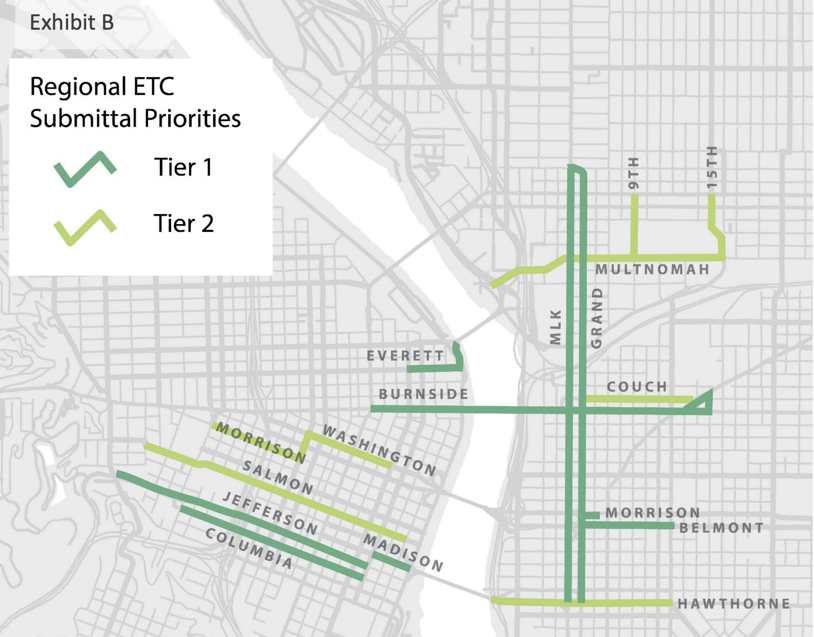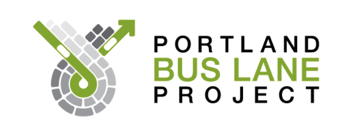
UPDATE: The plan was adopted 3-0.
At 2:00 pm today (6/20) Portland City Council is set to hear public testimony on the Enhanced Transit Corridors plan. The move will allow the Portland Bureau of Transportation to move forward with design and development of projects aimed at making transit faster, more reliable, and ultimately more competitive than driving.
“We know the Sirens of parking and automobility will sing. Please give PBOT the wax and rope it will need to sail safely past.”
— Portland Bus Lane Project ETC plan testimony
Activists who helped spur the plan are exciting to see it come to fruition, but they’ll testify today that PBOT should not cower to driving convenience. Volunteers with Portland Bus Lane Project will urge the City to make the plan’s language even stronger to ensure that it gives PBOT planners the tools they need to defend our streets against the scourge of driving abuse that’s killing our transit system.
You don’t even have to listen to activists to understand how too much driving is hurting transit in Portland. Here’s the language in today’s ordinance as written by PBOT themselves:
The City of Portland and the region are at a critical point in the evolution of our transit network; buses and streetcars, along with all the people on them, are increasingly stuck in traffic and getting slower. They are often delayed due to congestion while full of passengers and late to pick up new passengers. This leads to longer travel times by transit. It causes people to be delayed, miss transfers to other transit lines and ultimately arrive late to their destinations… all of this delay and unreliability shrinks people’s access to places by transit within a reasonable travel time and makes transit less competitive with driving… each year resources for transit service hours are spent just trying to keep up schedules due to congestion, reducing the potential funding to increase transit service frequency. TriMet spends roughly $1-2 million a year to add service just to keep up the same schedules… demand for transit service is only expected to increase… transit service will deteriorate over time, unless the City and TriMet do something significant to prioritize transit reliability and speed improvements in the Central City and along our key corridors and mains streets.
To help give them the tools they need to get the job done, Portland Bus Lane Project will call on the City to make good on its stated priorities of saving lives and using our streets to move people, not just vehicles. “There is no room in this list to ‘balance the needs’ of single-occupancy vehicle drivers,” write Bus Lane Project Co-Chair Paul Leitman and founding member Alan Kessler. “There’s no room for preservation of parking where the right-of-way could be better configured for safety and movement of people.”
Advertisement
Kessler and Leitman know that adopted policy will only go so far as long as agency culture still prevents bold actions. “Car priority is entrenched in traffic engineering,” they write. “Without explicit instruction from Council, engineers will tell planners that the changes we need to make are impossible, would require expensive traffic analysis, or would necessarily involve time-consuming outreach to stakeholders. City Council has the authority to direct the city’s engineers to look beyond the emphasis on personal vehicles and find creative, new approaches to these problems. And it should do so.”
Portland Bus Lane Project has two specific asks: They want every identified street segment that has document transit delays over the allowed threshold (those with a timing variation of between 50 and 75 percent) — and that has two or more existing vehicle lanes in the same direction — to be reconfigured with a dedicated, carfree transit lane; They also want lanes currently used for parking cars to be converted to “pro-time” (no parking during peak hours) or fully dedicated bus lanes on every street with delays over the threshold — and they want it done without further studies or public outreach.
“We know the Sirens of parking and automobility will sing,” reads their letter, “Please give PBOT the wax and rope it will need to sail safely past.”
The plan could also act as a bulwark against future attempts by outside actors who will defend the driving status quo at literally any cost. As reported yesterday by the New York Times, the billionaire Koch brothers are aggressively pushing back against transit projects all over the country in a misguided attempt to preserve the “freedom” of driving.
Once the ETC plan passes Council its recommendations will become part of Portland’s Transportation System Plan, it will allow PBOT to work closely with Metro on the Regional Enhanced Transit Concept Pilot Program, and it will trigger creation of an Intergovernmental Agreement (IGA) between PBOT and TriMet that will speed up project development.
PBOT expects to be complete 30 percent design by this winter and move into final design and implementation of first tier projects by late fall 2019.
Today’s hearing starts at 2:00 pm in Council Chambers at Portland City Hall. Get all the links and info via PBOT’s latest project announcement.
— Jonathan Maus: (503) 706-8804, @jonathan_maus on Twitter and jonathan@bikeportland.org
Never miss a story. Sign-up for the daily BP Headlines email.
BikePortland needs your support.


